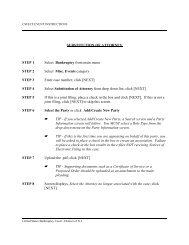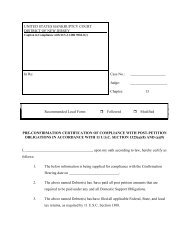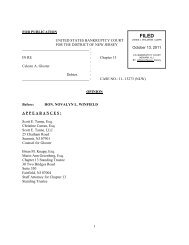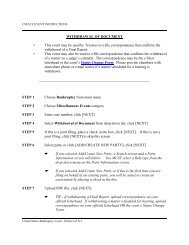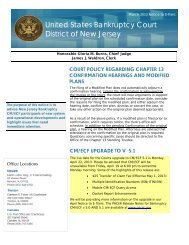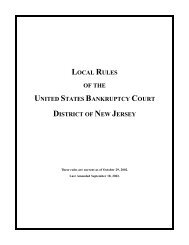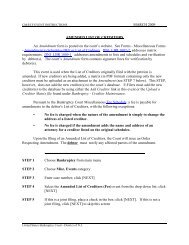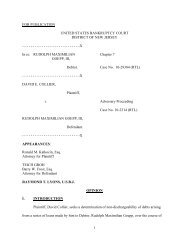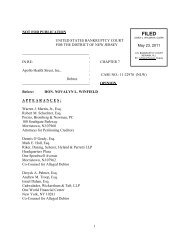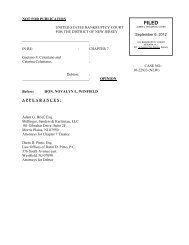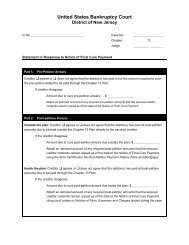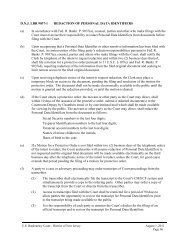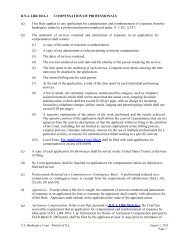In re Daniel and Maureen Maloney case 11-40584 April 16, 2012
In re Daniel and Maureen Maloney case 11-40584 April 16, 2012
In re Daniel and Maureen Maloney case 11-40584 April 16, 2012
You also want an ePaper? Increase the reach of your titles
YUMPU automatically turns print PDFs into web optimized ePapers that Google loves.
United States Bankruptcy Court<br />
District of New Jersey<br />
Mitchell H. Cohen U.S. Courthouse<br />
P.O. Box 2067<br />
Camden, New Jersey 08101<br />
JUDITH H. WIZMUR (856) 757-5126<br />
Chief, U.S. Bankruptcy Judge<br />
<strong>April</strong> <strong>16</strong>, <strong>2012</strong><br />
Thomas P. Lutz, Esq.<br />
Cornerstone Commerce Center<br />
1201 New Road, Suite 334<br />
Linwood, New Jersey 08221<br />
William P. Rubley, Esq.<br />
Subranni Zauber, LLC<br />
750 Route 73 South, Suite 307B<br />
Marlton, New Jersey 08053<br />
FILED<br />
JAMES J. WALDRON, CLERK<br />
<strong>April</strong> <strong>16</strong>, <strong>2012</strong><br />
U.S. BANKRUPTCY COURT<br />
CAMDEN, NJ<br />
BY: s/ The<strong>re</strong>sa O’Brien, Judicial<br />
Assistant to Chief Judge Wizmur<br />
Re:<br />
<strong>Daniel</strong> P. <strong>and</strong> Mau<strong>re</strong>en H. <strong>Maloney</strong><br />
Case No. <strong>11</strong>-<strong>40584</strong>/JHW<br />
LETTER OPINION<br />
Dear Counsel:<br />
<strong>In</strong> this matter, the debtors seek to voluntarily dismiss their Chapter 7<br />
<strong>case</strong>. The Chapter 7 trustee opposes dismissal as an attempt by the debtors to<br />
avoid the liquidation of a significant asset, a mortgage that is a critical source<br />
of support for the debtors, <strong>and</strong> as an attempt by the debtors to avoid the<br />
potential <strong>re</strong>covery by the trustee of several p<strong>re</strong>fe<strong>re</strong>nce payments made to the<br />
debtors’ family members shortly befo<strong>re</strong> the filing. The trustee contends that<br />
dismissal will seve<strong>re</strong>ly p<strong>re</strong>judice the unsecu<strong>re</strong>d c<strong>re</strong>ditor body, <strong>and</strong> moves for<br />
the turnover of the mortgage <strong>and</strong> its proceeds. The debtors assert that they<br />
will suffer a significant economic hardship if they a<strong>re</strong> compelled to <strong>re</strong>main in<br />
the Chapter 7 process, <strong>and</strong> that their c<strong>re</strong>ditors will not be p<strong>re</strong>judiced if the<br />
1
debtors a<strong>re</strong> <strong>re</strong>turned to their p<strong>re</strong>-filing position. For the <strong>re</strong>asons advanced, the<br />
debtors’ motion to voluntarily dismiss their <strong>case</strong> is granted, <strong>and</strong> the trustee’s<br />
motion for turnover is denied, on condition that the fees <strong>and</strong> expenses incur<strong>re</strong>d<br />
by the trustee in this <strong>case</strong> to date a<strong>re</strong> satisfied by the debtors.<br />
FACTS AND PROCEDURAL HISTORY<br />
<strong>Daniel</strong> P. <strong>and</strong> Mau<strong>re</strong>en H. <strong>Maloney</strong> filed a voluntary petition under<br />
Chapter 7 of the Bankruptcy Code on October 21, 20<strong>11</strong>. The debtors<br />
scheduled their principal <strong>re</strong>sidence as a condominium unit in Atlantic City,<br />
with negligible equity. Their mortgagee, the Bank of America, was the only<br />
listed secu<strong>re</strong>d c<strong>re</strong>ditor. The debtors scheduled approximately $90,000 in<br />
unsecu<strong>re</strong>d debt consisting enti<strong>re</strong>ly of c<strong>re</strong>dit card debt. As is <strong>re</strong>levant he<strong>re</strong>, in<br />
Schedule B, Personal Property, the debtors listed an inte<strong>re</strong>st in a business<br />
entity <strong>re</strong>fer<strong>re</strong>d to as Ocean B<strong>re</strong>eze Realty, LLC, assigning their inte<strong>re</strong>st a value<br />
of $0.00. As well, in <strong>re</strong>sponse to item #18 of Schedule B, “Other liquidated<br />
debts owed to debtor including tax <strong>re</strong>funds. Give particulars.”, the debtors<br />
listed “a mortgage on property they sold yeilding (sic) income of $2,000 per<br />
month,” which they also valued at $0.00. <strong>In</strong> Schedule G, Executory Contracts<br />
<strong>and</strong> Unexpi<strong>re</strong>d Leases, the debtors provided further information about the<br />
mortgage, disclosing that the mortgagor is named Khadim Hussain, <strong>and</strong> that<br />
he pays $2,075 per month to the debtors on account of the mortgage. The<br />
debtors included the monthly mortgage payment in Schedule I, Cur<strong>re</strong>nt <strong>In</strong>come<br />
2
of <strong>In</strong>dividual Debtor(s). This amount <strong>re</strong>p<strong>re</strong>sents over half of the debtors’<br />
monthly income, with the <strong>re</strong>mainder coming from Mr. <strong>Maloney</strong>’s pension<br />
benefits <strong>and</strong> Mrs. <strong>Maloney</strong>’s social security. Mr. <strong>Maloney</strong> is on a postal service<br />
disability pension, <strong>and</strong> Mrs. <strong>Maloney</strong> is on a social security disability pension.<br />
After deducting their expenses, the debtors showed a negative net monthly<br />
income of -$824.24 on Schedule J. <strong>In</strong> their Statement of Financial Affairs, in<br />
<strong>re</strong>sponse to question #10, “Other transfers”, the debtors disclosed that they<br />
sold property located at 3101 Boardwalk, Unit R-28, Atlantic City, New Jersey<br />
to Mr. Hussain for $150,000 on September 30, 20<strong>11</strong>, approximately a month<br />
prior to their bankruptcy filing, that they <strong>re</strong>ceived $40,000 in cash <strong>and</strong> that<br />
they took back a mortgage in the face amount of $<strong>11</strong>0,000.<br />
On October 24, 20<strong>11</strong>, Thomas J. Subranni was appointed as the Chapter<br />
7 trustee. A section 341(a) meeting of c<strong>re</strong>ditors was scheduled for November<br />
15, 20<strong>11</strong>. Several days prior to the 341(a) meeting, debtors’ counsel provided a<br />
copy of the mortgage <strong>and</strong> the HUD-1 RESPA statement to the trustee. During<br />
the 341(a) meeting, the trustee questioned the debtors about the mortgage.<br />
The trustee initially filed a Report of No Distribution on November 17, 20<strong>11</strong> but<br />
withd<strong>re</strong>w the document on November 22, 20<strong>11</strong>.<br />
Following the 341(a) meeting, in a letter to the trustee dated December 5,<br />
20<strong>11</strong>, counsel for the debtors explained that the mortgage at issue he<strong>re</strong> arose<br />
from the sale of a commercial condominium, which had been the business<br />
3
p<strong>re</strong>mises of Ocean B<strong>re</strong>eze Realty, LLC, a business in which the debtor, <strong>Daniel</strong><br />
<strong>Maloney</strong>, Sr., held a 60% inte<strong>re</strong>st, <strong>and</strong> his son, <strong>Daniel</strong> <strong>Maloney</strong>, Jr., held a 40%<br />
inte<strong>re</strong>st. Counsel contended that the mortgage taken back by the debtors<br />
should be valued at not mo<strong>re</strong> than $55,000, or 50% of its face value, for several<br />
<strong>re</strong>asons. First, the mortgage was taken with no “c<strong>re</strong>dit check or wage inquiry”<br />
on Mr. Hussain, the purchaser, <strong>and</strong> without a personal guarantee from him.<br />
As well, the condominium is very small (493 squa<strong>re</strong> feet), cannot be used for<br />
any food service business, is not permitted to have any exterior signs, <strong>and</strong> is<br />
not located on the Atlantic City boardwalk.<br />
<strong>In</strong> the December 5, 20<strong>11</strong> letter to the trustee, counsel advanced for the<br />
first time the allegation that the debtors’ son, <strong>Daniel</strong> <strong>Maloney</strong>, Jr., held a<br />
purchase money security inte<strong>re</strong>st in the business condominium <strong>and</strong> its<br />
proceeds. According to debtors’ counsel, this security inte<strong>re</strong>st, which<br />
appa<strong>re</strong>ntly was not documented by a mortgage, arose when the debtors’ son<br />
loaned money to the debtors in 2006 to finance the purchase of the business<br />
condominium <strong>and</strong> to <strong>re</strong>novate the business property. Certif. of Counsel in<br />
Oppos., Exh. B. <strong>In</strong> addition, the debtors’ son made “a contribution of capital”<br />
in the amount of $30,000 in March 20<strong>11</strong> which was needed by the LLC to<br />
continue operating while the debtors tried to find a buyer for the commercial<br />
condo unit. Id. Appended to the letter we<strong>re</strong> copies of two promissory notes<br />
memorializing the transactions, dated September 25, 2006 <strong>and</strong> March 15,<br />
20<strong>11</strong>, <strong>re</strong>flecting a total debt to the debtors’ son of $65,000. The letter<br />
4
explained that the debtors had expected to <strong>re</strong>pay their son from the sales<br />
proceeds of the business property but that the actual sales proceeds we<strong>re</strong><br />
insufficient. The debtors <strong>re</strong>ceived $40,000 in cash from the sale <strong>and</strong> paid<br />
$14,000 of that amount to their son. An additional $10,000 from the sales<br />
proceeds was paid to the debtor’s brother, Michael <strong>Maloney</strong>, who had also<br />
allegedly advanced money to assist in the original purchase of the property.<br />
Both the payment to the debtors’ son <strong>and</strong> the payment to the debtor’s brother<br />
appea<strong>re</strong>d on the HUD-1 RESPA statement, which was forwarded to the trustee<br />
prior to the 341(a) meeting.<br />
Accompanying the December 5 letter we<strong>re</strong> various amended schedules,<br />
which we<strong>re</strong> filed with the court on December 7, 20<strong>11</strong>. Schedule D was<br />
amended to include the secu<strong>re</strong>d claim asserted by the debtors’ son in the<br />
amount of $60,875. Schedule B was amended to list the mortgage at a value of<br />
“$55,000 or less”, subject to the debtors’ son’s security inte<strong>re</strong>st of over<br />
$60,000. Schedule C was amended to exempt $21,910 of the proceeds of the<br />
mortgage.<br />
On December 7, 20<strong>11</strong>, the same date that the debtors’ amended<br />
schedules we<strong>re</strong> filed, debtors’ counsel filed a proof of claim on behalf of the<br />
debtors’ son, <strong>Daniel</strong> <strong>Maloney</strong>, Jr., asserting a secu<strong>re</strong>d claim against the<br />
debtors’ bankruptcy estate in the amount of $60,875, as well as a priority<br />
5
claim for commissions of up to $<strong>11</strong>,725. 1 Attached to the proof of claim we<strong>re</strong><br />
copies of the two promissory notes between the debtors <strong>and</strong> their son. <strong>In</strong> both<br />
notes, the first in the amount of $35,000 <strong>and</strong> the second in the amount of<br />
$30,000, the debtors ag<strong>re</strong>ed to <strong>re</strong>pay their son in full from their <strong>re</strong>alty<br />
commissions or from the proceeds of the sale of the business property.<br />
<strong>In</strong> cor<strong>re</strong>spondence to the trustee dated January 19, <strong>2012</strong>, debtors’<br />
counsel advised that the debtors intended to file a motion to dismiss their <strong>case</strong>.<br />
Counsel acknowledged that the trustee’s challenge to the alleged security<br />
inte<strong>re</strong>st held by the debtors’ son was probably sustainable. If that security<br />
inte<strong>re</strong>st was invalid, “it would defeat the enti<strong>re</strong> point of my clients [sic] filing for<br />
bankruptcy in the first place.” Certif. of Counsel in Opp. to Debtors’ Motion to<br />
Convert, Exh. G. He also defended the debtors’ good faith, noting that all of the<br />
<strong>re</strong>levant documents had been disclosed to the trustee prior to the 341(a)<br />
meeting.<br />
The trustee moved on January 23, <strong>2012</strong> for the turnover of the Hussain<br />
note <strong>and</strong> mortgage to the bankruptcy estate, as well as the turnover of all post<br />
petition mortgage payments <strong>re</strong>ceived by the debtors from Mr. Hussain. The<br />
trustee asked that all futu<strong>re</strong> mortgage payments be di<strong>re</strong>cted to his office.<br />
1 Debtors’ counsel submitted a Limited Power of Attorney from <strong>Daniel</strong><br />
<strong>Maloney</strong>, Jr., authorizing him to file the proof of claim. The issue of the conflict<br />
of inte<strong>re</strong>st in <strong>re</strong>p<strong>re</strong>senting a debtor, <strong>and</strong> filing a proof of claim on behalf of a<br />
c<strong>re</strong>ditor in the same <strong>case</strong>, is not add<strong>re</strong>ssed in this opinion.<br />
6
On the next day, January 24, <strong>2012</strong>, the debtors moved to convert their<br />
<strong>case</strong> to Chapter 13. See <strong>11</strong> U.S.C. § 706(a). Citing to Marrama v. Citizens<br />
Bank of Mass., 549 U.S. 365, 127 S. Ct. <strong>11</strong>05, <strong>16</strong>6 L.Ed.2d 956 (2007), the<br />
Chapter 7 trustee challenged the debtors’ “absolute right” to convert to Chapter<br />
13, <strong>and</strong> contended that the debtors’ motion to convert should be denied. The<br />
trustee argued that<br />
The Debtors failed to disclose approximately $24,000 in payments<br />
to insiders; they attributed no value to a $<strong>11</strong>0,000 mortgage that<br />
they owned; they failed to identify the son as a c<strong>re</strong>ditor <strong>and</strong> only<br />
did so when it became appa<strong>re</strong>nt that the Trustee wanted to take<br />
possession of the mortgage they held; <strong>and</strong> then baselessly claimed<br />
the son had a security inte<strong>re</strong>st in the proceeds of the mortgage <strong>and</strong><br />
the<strong>re</strong>fo<strong>re</strong> it had no actual value to the estate.<br />
Certif. of Counsel in Oppos. at 5, 17. The trustee argued further that the<br />
debtors we<strong>re</strong> unable to propose a confirmable plan, unsecu<strong>re</strong>d c<strong>re</strong>ditors would<br />
be p<strong>re</strong>judiced, <strong>case</strong> administration would not be mo<strong>re</strong> efficient, <strong>and</strong> allowing<br />
conversion would be an abuse of the bankruptcy process.<br />
<strong>In</strong> <strong>re</strong>sponse to the suggestion by the trustee that the Chapter 7 <strong>case</strong> was<br />
filed in bad faith, the debtors noted that the mortgage in question was<br />
disclosed in several places in their petition <strong>and</strong> that it was provided to the<br />
trustee prior to the 341(a) meeting. Debtors’ counsel explained that when he<br />
p<strong>re</strong>pa<strong>re</strong>d the petition, he believed that the $2,075 mortgage only <strong>re</strong>p<strong>re</strong>sented<br />
income to the debtors, <strong>and</strong> would not otherwise be characterized as an asset<br />
that could be liquidated by the trustee for the benefit of the Chapter 7 estate.<br />
7
Counsel acknowledged that he failed to notice the payments to insiders made<br />
at the settlement on the debtors’ commercial property <strong>and</strong> noted on the HUD-1<br />
statement, admitting further that if he had noticed the payments, he “never<br />
would have allowed the Debtors to file bankruptcy at all.” Counsel’s Certif. in<br />
Reply at 3, 10. He insisted that the debtors have been “c<strong>and</strong>id <strong>and</strong><br />
forthright” <strong>and</strong> that no dishonesty has been involved. With <strong>re</strong>spect to the<br />
feasibility of a proposed Chapter 13 plan, counsel indicated that the debtors’<br />
petition would be amended to <strong>re</strong>flect “changed financial circumstances which,<br />
along with a contribution from another family member” would <strong>re</strong>sult in a<br />
feasible, confirmable plan. Id. at 4, 15. 2<br />
The trustee’s motion for turnover <strong>and</strong> the debtors’ motion to convert<br />
came on to be heard in court on February 14, <strong>2012</strong>. Debtors’ counsel<br />
acknowledged that a Chapter 13 plan did not appear to be feasible, the debtors’<br />
motion to convert their <strong>case</strong> to Chapter 13 was withdrawn, <strong>and</strong> the matter was<br />
carried to afford the debtors an opportunity to file a motion to voluntarily<br />
dismiss the <strong>case</strong>.<br />
2 <strong>In</strong> several submissions to the court <strong>and</strong> in testimony offe<strong>re</strong>d by Mr.<br />
<strong>Maloney</strong>, he accused the trustee of t<strong>re</strong>ating him <strong>and</strong> his wife unfairly, of<br />
dealing with the debtors in an unduly harsh manner, <strong>and</strong> of discriminating<br />
against them because they we<strong>re</strong> disabled <strong>and</strong> because they we<strong>re</strong> collecting<br />
disability payments. I am not asked in the motions befo<strong>re</strong> me to make fact<br />
findings <strong>re</strong>garding these allegations, or to attach consequences to these<br />
allegations. I simply note that these allegations have been made.<br />
8
On February 27, <strong>2012</strong>, the debtors moved to dismiss their Chapter 7<br />
<strong>case</strong>. <strong>In</strong> an affidavit <strong>and</strong> in testimony p<strong>re</strong>sented in court on March 20, <strong>2012</strong>,<br />
Mr. <strong>Maloney</strong> explained that the “bankruptcy filing was based enti<strong>re</strong>ly on [the<br />
debtors’] misunderst<strong>and</strong>ing of the t<strong>re</strong>atment of this monthly [mortgage]<br />
payment.” <strong>Daniel</strong> <strong>Maloney</strong> Affid. at 3, <strong>11</strong>. He insisted that they “would not<br />
have filed for bankruptcy otherwise.” Id. He is looking for employment, <strong>and</strong><br />
believes that he will be able to pay some portion of the debtors’ c<strong>re</strong>dit card debt<br />
outside of bankruptcy with help from family members <strong>and</strong> with anticipated<br />
earnings from employment. If they a<strong>re</strong> compelled to stay in bankruptcy <strong>and</strong><br />
lose the income from the monthly mortgage payment, he believes that they will<br />
most likely default on their home mortgage <strong>and</strong> lose their home to fo<strong>re</strong>closu<strong>re</strong>.<br />
He explained that his son has ag<strong>re</strong>ed to forgo debt <strong>re</strong>payment while the debtors<br />
negotiate with their other c<strong>re</strong>ditors on <strong>re</strong>payment terms. He also noted that he<br />
was pursuing a loan modification of his home mortgage to devote additional<br />
<strong>re</strong>sources to satisfy existing c<strong>re</strong>ditors.<br />
<strong>In</strong> opposing the motion to dismiss, the trustee states that the debtors<br />
have “done everything they could think of to shield this asset from the<br />
Trustee.” Trustee’s Memo in Oppos. at 2. On their initial schedules, the<br />
debtors listed the value of the mortgage as $0, failed to disclose the $24,000 in<br />
insider payments that we<strong>re</strong> made, <strong>and</strong> did not list <strong>Daniel</strong> <strong>Maloney</strong>, Jr. as a<br />
c<strong>re</strong>ditor. The trustee contends that the debtors have not shown good cause for<br />
dismissal. They <strong>re</strong>ly only upon their attorney’s mistaken belief that the<br />
9
Hussain mortgage constituted income rather than a saleable asset. This is a<br />
legal error, <strong>and</strong> not a factual mistake. The trustee believes that the debtors<br />
have “on mo<strong>re</strong> than one occasion included deliberately false information in<br />
their Petition.” Id. at 5. He asserted that “[w]hen it became clear that none of<br />
their attempts to shield the mortgage from the trustee we<strong>re</strong> going to work,” the<br />
debtors turned to “baselessly accusing the Trustee of disability discrimination .<br />
. . acting unethically,” <strong>and</strong> <strong>re</strong>taliating against them. Id. The trustee seeks to<br />
take possession of <strong>and</strong> to liquidate the mortgage, <strong>and</strong> to prosecute the<br />
adversary proceeding filed to <strong>re</strong>cover the p<strong>re</strong>fe<strong>re</strong>ntial payments allegedly made.<br />
DISCUSSION<br />
Section 707(a) of the Bankruptcy Code provides that the court may<br />
dismiss a Chapter 7 <strong>case</strong> “only after notice <strong>and</strong> a hearing <strong>and</strong> only for cause.”<br />
<strong>11</strong> U.S.C. § 707(a). A Chapter 7 debtor may move for voluntary dismissal<br />
under this section, but has no absolute statutory right to do so. <strong>In</strong> <strong>re</strong><br />
Aupperle, 352 B.R. 43, 45 (Bankr. D.N.J. 2005). The debtor has the burden of<br />
demonstrating sufficient cause for dismissal. <strong>In</strong> <strong>re</strong> Turpen, 244 B.R. 431, 434<br />
(8 th Cir. BAP 2000). “Determining whether sufficient cause exists is committed<br />
to the sound disc<strong>re</strong>tion of the bankruptcy court.” <strong>In</strong> <strong>re</strong> Jabarin, 395 B.R. 330,<br />
337 (Bankr. E.D.Pa. 2008).<br />
10
Courts have developed certain factors to help guide the determination of<br />
whether sufficient cause exists to grant voluntary dismissal, including:<br />
(1) whether all of the c<strong>re</strong>ditors have consented;<br />
(2) whether the debtor is acting in good faith;<br />
(3) whether dismissal would <strong>re</strong>sult in a p<strong>re</strong>judicial delay in payment;<br />
(4) whether dismissal would <strong>re</strong>sult in a <strong>re</strong>ordering of priorities;<br />
(5) whether the<strong>re</strong> is another proceeding through which the<br />
payment of claims can be h<strong>and</strong>led; <strong>and</strong><br />
(6) whether an objection to discharge, an objection to exemptions,<br />
or a p<strong>re</strong>fe<strong>re</strong>nce claim in pending.<br />
<strong>In</strong> <strong>re</strong> Aupperle, 352 B.R. at 46 (quoting <strong>In</strong> <strong>re</strong> Turpen, 244 B.R. 431, 434 (8 th<br />
Cir. BAP 2000)). These factors serve to determine “whether or not the<br />
dismissal is in the best inte<strong>re</strong>sts of the debtor <strong>and</strong> the c<strong>re</strong>ditors of the estate.”<br />
Id. (citing to <strong>In</strong> <strong>re</strong> McCullough, 229 B.R. 374, 376 (Bankr. E.D.Va. 1999)). Put<br />
another way, the determination of sufficient cause to dismiss <strong>re</strong>qui<strong>re</strong>s “a<br />
factually intensive assessment of the debtors’ <strong>re</strong>asons for <strong>re</strong>questing dismissal<br />
<strong>and</strong> of the impact dismissal can be expected to have on the c<strong>re</strong>ditors.” <strong>In</strong> <strong>re</strong><br />
Jabarin, 395 B.R. at 339. This assessment has been labeled as a “balancing<br />
test,” <strong>re</strong>quiring the bankruptcy court to consider the likely effect of dismissal or<br />
non-dismissal on both the debtors <strong>and</strong> the c<strong>re</strong>ditors. Id.<br />
An assessment he<strong>re</strong> of the debtors’ <strong>re</strong>asons for <strong>re</strong>questing dismissal do<br />
not suggest a lack of good faith on the part of the debtors. The debtors<br />
<strong>11</strong>
essentially <strong>re</strong>lied on the errors made by counsel in failing to properly<br />
characterize the natu<strong>re</strong> of the asset held by the debtors <strong>and</strong> failing to identify<br />
certain p<strong>re</strong>fe<strong>re</strong>ntial payments. But for these errors, the debtors contend that<br />
they would never have filed for bankruptcy protection.<br />
Generally speaking, “[c]ourts a<strong>re</strong> not imp<strong>re</strong>ssed with complaints of<br />
attorney negligence, lack of <strong>re</strong>p<strong>re</strong>sentation, or errors in judgment by debtors<br />
when considering motions for voluntarily (sic) dismissal.” <strong>In</strong> <strong>re</strong> Hopper, 404<br />
B.R. 302, 308 (Bankr. N.D.Ill. 2009). But in this <strong>case</strong>, the errors a<strong>re</strong><br />
significant, <strong>and</strong> include: (1) counsel’s mistaken belief that the mortgage held<br />
by the debtors was worthless to the bankruptcy estate, <strong>and</strong> would be<br />
conside<strong>re</strong>d only in light of the income generated from the mortgage rather than<br />
as an asset; (2) counsel’s mistaken belief that the so-called “purchase money<br />
security inte<strong>re</strong>st” held by the debtors’ son was valid even without<br />
documentation of a mortgage, <strong>and</strong> (3) counsel’s failu<strong>re</strong> to note on the HUD<br />
sheet from the sale of the property that $24,000 was paid to the debtors’ son<br />
<strong>and</strong> to the debtor’s brother shortly befo<strong>re</strong> the filing.<br />
Counsel for the debtors has c<strong>and</strong>idly <strong>and</strong> forthrightly acknowledged<br />
these errors, <strong>and</strong> has further acknowledged that he would have advised his<br />
clients not to file a bankruptcy <strong>case</strong> if he would have properly assessed all of<br />
the circumstances.<br />
12
This is a ra<strong>re</strong> <strong>case</strong> whe<strong>re</strong> the good faith of the debtors is not accurately<br />
<strong>re</strong>flected by the circumstances. The trustee has been properly pursuing the<br />
mortgage secu<strong>re</strong>d by the debtors, <strong>and</strong> has underst<strong>and</strong>ably surmised that the<br />
circumstances pointed to the debtors’ lack of good faith. But the c<strong>and</strong>idly<br />
acknowledged mistakes committed by the debtors’ counsel explain these<br />
circumstances in large part. Most significantly, notwithst<strong>and</strong>ing the<br />
deficiencies noted above in the schedules, the debtors did disclose all aspects<br />
of their financial circumstances from the outset, even befo<strong>re</strong> the first meeting of<br />
c<strong>re</strong>ditors, with one notable exception. While the HUD sheet noting the<br />
payments to family members made at settlement was given to debtors’ counsel<br />
<strong>and</strong> to the trustee, the<strong>re</strong> was no indication on the initial schedules filed that a<br />
debt was still due <strong>and</strong> owing to the debtors’ son. Notwithst<strong>and</strong>ing this<br />
omission, I am p<strong>re</strong>pa<strong>re</strong>d on this <strong>re</strong>cord to conclude that the debtors acted in<br />
good faith in filing their petition.<br />
We turn then to the impact a dismissal would have on the c<strong>re</strong>ditors of<br />
the bankruptcy estate. As in the Jabarin <strong>case</strong>, the debtors he<strong>re</strong> seek a<br />
dismissal of their bankruptcy <strong>case</strong> because the Chapter 7 trustee has targeted<br />
assets that may provide a source of distribution to c<strong>re</strong>ditors.<br />
One court has observed that “[t]he discovery of assets is not cause<br />
to dismiss” a bankruptcy <strong>case</strong>, but rather, “[i]f anything, . . . is<br />
grounds for <strong>re</strong>taining jurisdiction, i.e., that c<strong>re</strong>ditors who perhaps<br />
expected to <strong>re</strong>cover nothing on their claims may be assu<strong>re</strong>d of an<br />
equitable <strong>and</strong> full distribution of the debtor’s newly discove<strong>re</strong>d<br />
assets.” <strong>In</strong> <strong>re</strong> Baumgarten, 154 B.R. 66, 69 (Bankr. S.D. Ohio<br />
1993) (citing <strong>In</strong> <strong>re</strong> Williams, 15 B.R. 655 (E.D.Mo. 1981), aff’d, 696<br />
F.2d 999 (8 th Cir. 1982) (Table) <strong>and</strong> <strong>In</strong> <strong>re</strong> Blackman, 3 B.R. <strong>16</strong>7<br />
13
(Bankr. S.D. Ohio 1980)). That the intended use of the discove<strong>re</strong>d<br />
assets is the support of the debtor’s family does not alter this<br />
general principle. See <strong>In</strong> <strong>re</strong> Cink, 2007 WL 601585 at *3 (the<br />
“[d]ebtor’s desi<strong>re</strong> to p<strong>re</strong>serve family property does not constitute<br />
cause for dismissal”).<br />
395 B.R. at 342. See also <strong>In</strong> <strong>re</strong> Jong Hee Kang, No. <strong>11</strong>-43988, <strong>2012</strong> WL<br />
614785 (Bankr. D.N.J. Feb. 27, <strong>2012</strong>). The assets p<strong>re</strong>viously targeted by the<br />
trustee a<strong>re</strong> sought to be <strong>re</strong>tained by the debtors for their ongoing support, but<br />
that motivation does not by itself serve he<strong>re</strong> to overcome the p<strong>re</strong>judice to<br />
c<strong>re</strong>ditors that would be occasioned by a dismissal of the <strong>case</strong>.<br />
P<strong>re</strong>judice to the c<strong>re</strong>ditors may also be discerned in light of the pending<br />
p<strong>re</strong>fe<strong>re</strong>nce actions against the debtor’s brother <strong>and</strong> son. As noted above, the<br />
debtors paid their family members $24,000, less than one month befo<strong>re</strong> the<br />
filing, on account of the outst<strong>and</strong>ing debt due to them. Outside of the<br />
bankruptcy process, those payments may not be <strong>re</strong>coverable.<br />
I must also observe that the debtors a<strong>re</strong> not able to offer their c<strong>re</strong>ditors a<br />
<strong>re</strong>alistic <strong>re</strong>payment plan. Mr. <strong>Maloney</strong>, who is on a disability pension,<br />
proposes to seek employment, but acknowledges his physical limitations. Mrs.<br />
<strong>Maloney</strong> is on Social Security disability. Even with <strong>re</strong>ceipt of the monthly<br />
mortgage payment of $2,000, the debtors’ monthly expenses exceed their<br />
monthly income. The<strong>re</strong> is no <strong>re</strong>asonable prospect of a <strong>re</strong>payment to c<strong>re</strong>ditors if<br />
the <strong>case</strong> is dismissed. <strong>In</strong> <strong>re</strong> Hopper, 404 B.R. at 3<strong>11</strong> (“The Debtor’s vow to pay<br />
her c<strong>re</strong>ditors in the futu<strong>re</strong> does not dispel such p<strong>re</strong>judice.”).<br />
14
Having determined that the debtors have acted in good faith in filing<br />
their petition <strong>and</strong> in seeking a dismissal of the <strong>case</strong>, <strong>and</strong> that c<strong>re</strong>ditors will be<br />
p<strong>re</strong>judiced by a dismissal, I am faced with the ultimate issue of whether cause<br />
for dismissal has been established. To arrive at that conclusion, I must<br />
balance the likely effect of dismissal or non-dismissal on both the debtors <strong>and</strong><br />
the c<strong>re</strong>ditors. As to the debtors, the consequences of non-dismissal a<strong>re</strong><br />
catastrophic. Apart from the monthly payment <strong>re</strong>ceived as mortgagees, the<br />
debtors’ combined income from Social Security <strong>and</strong> pension disability is<br />
$1,700.76. With the <strong>re</strong>ceipt of the mortgage payment, their monthly income is<br />
$3,775.76, while their monthly expenses, including a $1,940 mortgage<br />
payment <strong>and</strong> $700 a month toward <strong>re</strong>al estate taxes on their <strong>re</strong>sidential<br />
condominium unit, amount to $4,600. Even with the monthly payment of<br />
$2,075, the deficit is $824 a month. The expenses listed a<strong>re</strong> very low, with<br />
food listed at $400 per month <strong>and</strong> clothing at $50 per month for both debtors.<br />
The debtors’ assertion that they would lose their home to fo<strong>re</strong>closu<strong>re</strong> is<br />
certainly borne out as a probability by the income <strong>and</strong> expense pictu<strong>re</strong><br />
<strong>re</strong>flected in their schedules.<br />
As to the loss of the mortgage as an asset, the principal amount of the<br />
mortgage at this point is about $100,000. We can <strong>re</strong>asonably assume that if<br />
the trustee liquidates the mortgage, the purchase price of the mortgage will be<br />
substantially discounted from the face amount. Any excess value that would<br />
have inu<strong>re</strong>d to the benefit of the debtors will be lost.<br />
15
On the c<strong>re</strong>ditors’ side, we assume from this analysis that the trustee<br />
would liquidate the mortgage, <strong>and</strong> would prosecute the p<strong>re</strong>fe<strong>re</strong>nce actions. 3<br />
Debtors’ counsel has offe<strong>re</strong>d several c<strong>re</strong>dible <strong>re</strong>asons for concluding that the<br />
price to be achieved for the mortgage might be about 50% of the face amount<br />
due, or approximately $50,000. While this is admittedly speculative, I will <strong>re</strong>ly<br />
on it for purposes of this analysis. I will also assume that the trustee will<br />
ultimately be successful in <strong>re</strong>ceiving some <strong>re</strong>turn on the p<strong>re</strong>fe<strong>re</strong>nce payments<br />
made to the debtors’ family members, or about $15,000. 4 To be offset against<br />
the pool of estate funds available for distribution to the c<strong>re</strong>ditors would be the<br />
cost of administration, estimated to be about $26,500, 5 <strong>and</strong> the debtors’<br />
claimed exemptions of $21,910, leaving about $<strong>16</strong>,590 to distribute to<br />
c<strong>re</strong>ditors. The c<strong>re</strong>ditor body is comprised of filed claims totaling $132,797.84,<br />
which may <strong>re</strong>alistically be <strong>re</strong>duced to about $107,000. 6 Nearly half of the<br />
3 The debtors’ <strong>re</strong>sidence does not appear to have any equity beyond the<br />
mortgage against the property.<br />
4 Assuming that the trustee <strong>re</strong>ceives judgments against both the debtors’<br />
son <strong>and</strong> the debtor’s brother, a discount is assumed to account for potential<br />
collection issues.<br />
5 Obviously, it is impossible to assess with accuracy the actual cost of<br />
administration. We can ascertain that if $65,000 is available for disbursement,<br />
than the Chapter 7 trustee would be entitled to compensation in the<br />
approximate amount of $6,500. See <strong>11</strong> U.S.C. § 326(a). It is not difficult to<br />
imagine that the trustee would need to spend at least $20,000 in legal fees to<br />
administer this <strong>case</strong>, particularly in light of the legal <strong>re</strong>sources al<strong>re</strong>ady<br />
committed to the <strong>case</strong> to date, as well as the potential difficulties involving the<br />
sale of the mortgage.<br />
6 The proof of claim filed on behalf of the debtors’ son appears to include<br />
commissions ($<strong>11</strong>,725) due from the <strong>re</strong>al estate company owed by the debtor<br />
<strong>and</strong> his son rather than from the debtors. As well, the proof of claim does not<br />
<strong>16</strong>
claims a<strong>re</strong> held by the debtors’ son. Each c<strong>re</strong>ditor would <strong>re</strong>ceive a dividend of<br />
about 15.5% on each claim.<br />
<strong>In</strong> the normal course, I do not believe that a balancing of the <strong>re</strong>spective<br />
detriment to a debtor versus the detriment to the c<strong>re</strong>ditor body in determining<br />
whether cause exists to dismiss a Chapter 7 <strong>case</strong> entails an arithmetic formula<br />
arrived at through estimation <strong>and</strong> guesswork about the ultimate dividend that<br />
might be achieved by c<strong>re</strong>ditors if the <strong>case</strong> is fully administe<strong>re</strong>d. Nevertheless, I<br />
have engaged in that analysis he<strong>re</strong> to examine the potential outcomes of<br />
dismissal or non-dismissal under these very unusual <strong>and</strong> difficult<br />
circumstances. A balancing of the potential outcomes leads me to the<br />
conclusion that the debtors have shown sufficient cause to warrant dismissal<br />
under § 707(a).<br />
My conclusion is butt<strong>re</strong>ssed by several additional factors. This is the<br />
debtors’ first bankruptcy filing. The<strong>re</strong> we<strong>re</strong> no p<strong>re</strong>petition collection efforts by<br />
the c<strong>re</strong>ditors, <strong>and</strong> the c<strong>re</strong>ditors will be <strong>re</strong>turned to the same collection<br />
opportunities they had befo<strong>re</strong> the petition was filed. Dismissal of the <strong>case</strong> will<br />
not occasion any <strong>re</strong>ordering of priorities.<br />
account for the $14,000 paid to the c<strong>re</strong>ditor p<strong>re</strong>-petition on account of the<br />
claim.<br />
17
CONCLUSION<br />
I conclude that the debtors’ motion to dismiss the <strong>case</strong> is granted, <strong>and</strong><br />
the trustee’s motion for turnover of the mortgage <strong>and</strong> its proceeds is denied. Of<br />
course, we must condition the dismissal of the <strong>case</strong> on the satisfaction by the<br />
debtors of the <strong>re</strong>sources expended by the trustee to date, including attorneys’<br />
fees, on this <strong>case</strong>. I di<strong>re</strong>ct the trustee to file an application for fees <strong>and</strong> costs<br />
within 14 days of this letter opinion. The application will be set down for<br />
hearing on May 15, <strong>2012</strong> at 2:00 p.m. Any objections to the fees <strong>and</strong> expenses<br />
sought must be submitted by May <strong>11</strong>, <strong>2012</strong>. A final fee award will be ente<strong>re</strong>d.<br />
The monthly mortgage payment must be di<strong>re</strong>cted to the trustee until the fee<br />
award is satisfied in full, after which the payment will be <strong>re</strong>di<strong>re</strong>cted to the<br />
debtors.<br />
Debtors’ counsel shall submit an order in conformance he<strong>re</strong>with.<br />
___________________________<br />
JUDITH H. WIZMUR<br />
CHIEF JUDGE<br />
U.S. BANKRUPTCY COURT<br />
18



